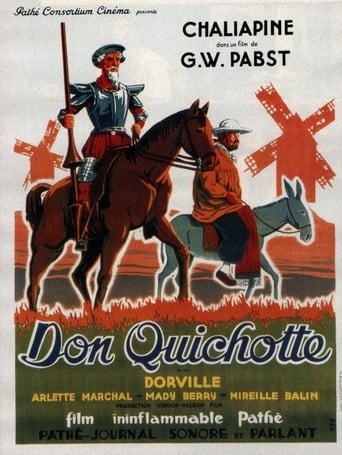MartinHafer
There are two reasons why I chose to watch this film. First, it was in the public domain, so it was free to watch (a definite plus) and second it was directed by the famous German director, G. W. Pabst. Well, despite this, I just did not enjoy the film. One of the main problems was the casting of the main character. Feodor Chaliapin Sr. was an excellent operatic type of singer from Russia. And, while I'll freely admit that he had a lovely voice, the guy was all wrong as Quixote. His accent was VERY strong and it sounded as if he really didn't know English but was doing his lines phonetically. It just seemed weird to have have this sort of accent coming out of a guy who was supposed to be Spanish. Second, instead of the normal version of the Cervantes book, this a musical where again and again Chaliapin would break into song for absolutely no reason--and the songs just didn't fit the film. It was as if his performance was important but the plot wasn't--why else would they put this guy in the lead? So what's the rest of the English language version like? Well, the acting was pretty good--even if the actors were often very English. The sets looked nice and the acting was good. But because of the musical nature of the film, I just can't recommend it to anyone--as who would like this sort of film? It certainly hasn't aged well and I can see why it's a rather obscure public domain film.
Benoît A. Racine (benoit-3)
The French version of this film is available on DVD along with the English version, which is 6 minutes shorter and missing just a few brief scenes and cut differently, with a longer written introduction and conclusion. Chaliapine's French is marginally better than his English and this film gives an astounding impression of his peculiarities as a singing actor: his tendency to interpolate subliminal sighs and groans between notes and his sometimes approximate pitch, which was probably another actor's trick. Besides, he was a "Don Quixote" expert, having created the title role of Massenet's 1910 opera of the same name. These films (the French, English and German versions) were an attempt to capture his legendary stage performance of this character even though the songs are by Jacques Ibert. Ravel had also been asked to compose the songs for the film but he missed the deadline and his songs survive on their own with texts that are different from those found here. The interplay between the French and English versions is fascinating. Some scenes are done exactly the same for better or worse, some use the same footage, re-cut to edit out performance problems, while others have slight variants in staging and dialog. (The English version was doctored by Australian-born scriptwriter and director John Farrow, Mia's father, by the way.) Even though the films are short and they transform, reduce and simplify considerably the original novel, they still manage to carry the themes and the feeling that would make "Man of La Mancha" a hit several decades later and to be evocative of Cervantes' Spain. The ending (which has a jolting special effect I will not reveal) is particularly effective and touching. Both the French and English prints are marred by a few jumps caused by missing frames which unfortunately make those films useless as a perfect recording medium for most of the songs but they are still very watchable and enjoyable. Chaliapine did record his four songs in 1933 for 78 RPM records and they and Sancho's song have been issued on a Marco Polo album (Jacques Ibert Film Music, 8.22387) sung by Henry Kiichli, which uses the published lyrics, which are a little different from the film's lyrics. All performances, except the death scene, appear to have been recorded live. Donnio does his role of Carrasco in both languages and the French Panza Dorville is as spectacular as his English counterpart George Robey is relaxed. All the supporting roles are well played in both versions. I found the English translation of the lyrics intelligent, poetic and perceptive. All in all, a very interesting bilingual package for the discerning opera and film amateur, edited by a video company that specializes in legendary musical performances.
semi-buff
Having only once attempted unsuccessfully to slog my way through the Peter O'Toole version of "Man of la Mancha," I was unfamiliar the plot of Don Quixote. I discovered this film at movieflix.com, a nice resource of free films. Even with the poor visual and sound quality of that site, this movie shines. Chaliapin and Robey are wonderful. (BTW, when another commenter refers to "Sancho caressing his ass in tears," he means his donkey.) Chaliapin's beautifully rich voice is matched by his acting, and he brings the full range of emotion to his role. It's a shame that this is the only film he sings in. There is much comedy and pathos here and it's beautifully directed. Highly recommended!
psteier
I saw the New York Museum of Modern Art's print (the English language version). Only Chaliapin does much singing, but the music and lyrics are not much and I suggest you listen to his recordings to judge his singing. His acting seems very much staged.George Robey is very good as Sancho Panza (Don Quixote's servant), playing him as a Music Hall character. The scene with the traveling players at an inn is also interesting and fun.


 AD
AD
